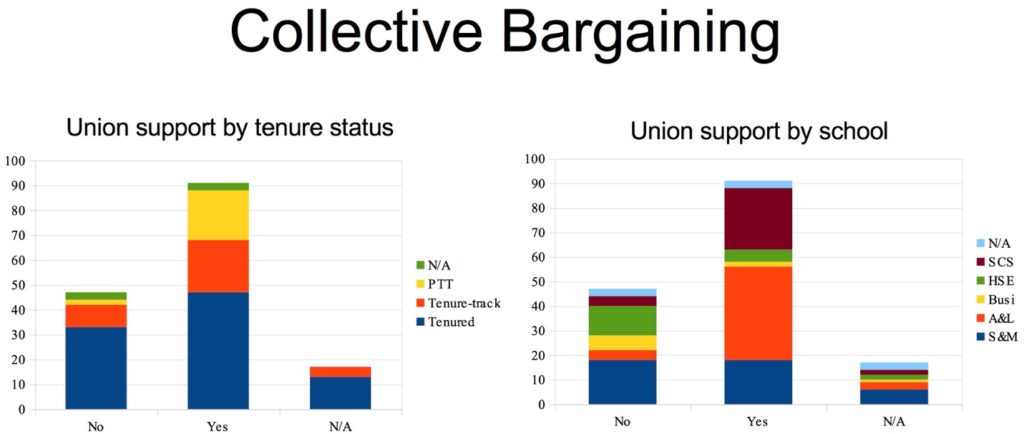AAUP State of the University Survey Findings Report
In September 2020, the Truman State University chapter of the American Association of University Professors conducted a survey to determine perceptions and opinions of the faculty over four broad topics: the relationship between faculty and administration, the COVID-19 pandemic response in 2020, issues affecting faculty morale and performance, and the perception of AAUP and collective bargaining among faculty. This report summarizes our findings from this survey. Raw results are posted at the Truman AAUP website in spreadsheet form, while the Google Form analytics can be viewed at this link by signing into Google with your Truman credentials.
Response Data
155 faculty responded to at least one question on the survey (no questions were required and some chose to not respond to some questions). 60% of the responses were from tenured faculty, 22% were from tenure-track faculty, and 14% were from non-tenure track faculty. All five Schools of the University were represented, with the School of Arts & Letters representing the most responses and the School of Business representing the least.
Faculty-Administration Relations
Faculty opinion on Truman’s current administration was variable depending on the precise question asked. Perceptions of chair and dean effectiveness and competence was seen as good, while opinions specifically of the Provost’s and President’s actions were more bimodal. Perceptions of the Board of Governor’s accessibility were somewhat negative. Comments made about the President’s job were largely negative (26/38 comments), a trend that held for the Provost as well (18/29 comments). In both cases, the common thread among comments was a concern about interactions of these administrators with the faculty (or lack thereof).
The COVID-19 Pandemic Response
Overall the administration response to the COVID-19 pandemic is weakly positive, especially the sentiment around the March 2020 pivot to distance education. Common threads among the written comments are administration transparency regarding COVID-19 and concern about adequate testing and protection for all people associated with the University.
Faculty Morale and Concerns
While faculty feel that they have adequate physical and technological resources to execute their duties, morale is low and serious concerns still abound about compensation for faculty labor, despite personal commitment to the University being weakly positive. In addition, mild concern about Truman’s capability to recruit quality faculty candidates. In the written comments, the three most numerous topics were faculty morale, the workload expected by the university, and the appropriate use of non-tenure track faculty. Concerns about salary, student enrollment, and concerns about faculty scholarship were also seen multiple times.
Perceptions of AAUP and Collective Bargaining
Most respondents reported having some familiarity with the Truman AAUP chapter and its purpose. In addition, 66% of respondents answering said they would support a collective bargaining unit at Truman. Analysis of the demographics of responses to this question revealed that while the majority of non-tenure track and untenured tenure-track faculty supported collective bargaining (something to be expected), over half of tenured faculty also supported collective bargaining. In addition, support for collective bargaining was seen in all five Schools of the university, though with wildly varying proportions. Arts & Letters and Cultural Studies was massively in favor, Science & Mathematics support was split, and Health Sciences & Education together with Business were massively against unionization. Support for and against unionization was observed in all Schools, however (see figures below).

